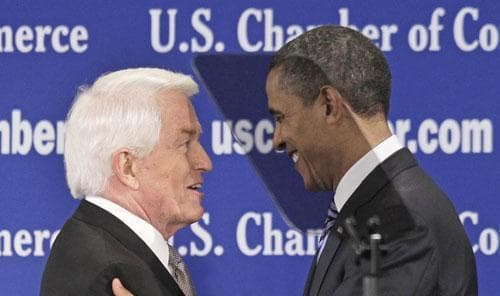Advertisement
Our Changing Economy: New Ups & Persistent Downs
ResumeDow over 12,000. President meets with the Chamber of Commerce. What now for the U.S. economy?

The President’s been talking with the Chamber of Commerce. Dow’s over 12,000 again. Business profits are way up.
But everybody’s still worried about America’s economic future, and millions of Americans are living an untenable economic life right now. Unemployed. Under-employed. Watching savings, homes, benefits, dreams all drift away.
So, what’s coming here? What are the big trends rolling around us that will decide the future of our economic standing and health?
Economist Daniel Altman talks about the big, deep trends pushing the global economy now.
-Tom Ashbrook
Guests:
Daniel Altman, author of, “Outrageous Fortunes: The Twelve Surprising Trends That Will Reshape the Global Economy.” He is former economics columnist for the New York Times, the International Herald Tribune and The Economist. He is currently director of Dalberg Global Development Advisors, a consulting firm that specializes in international development, and founder of North Yard Economics, a not-for-profit consulting firms serving developing countries.
An excerpt from Daniel Altman's "Outrageous Fortunes":
The global economy is changing more quickly than ever before in its history. The technologies that have made it more integrated—primarily those that have improved transportation and the exchange of information—continue to develop, and the number of interactions among people from all parts of the world is growing exponentially. These changes are having a profound effect on our lives. In the past two decades, we have seen hundreds of millions of people escape poverty, but we have also seen a severe deterioration in our natural environment and the bursting of huge financial bubbles.
Despite the refinement of economic policies designed to manage the business cycle, the volatility of commodity prices, trade flows, government budgets, and many other important indicators of the global economy continues to increase. As a result, it is easy to get caught up in the stream of numbers that spew out every second and to lose sight of the long term. That's a problem for our future. Personal fortunes may be gained and lost in a day, but national fortunes are gained and lost because of deeply ingrained economic factors that take years to develop and, if necessary, to change. Certainly, idiosyncratic events can push countries to one side or the other of their long-term economic paths. But over the course of decades, those paths tend to be determined by economic factors with very deep roots indeed.
These deep factors do not necessarily explain why stock markets rise and fall in the course of a single day, hour, or minute, but they do set limits on the material standards of living that an economy can achieve. If the pursuit of economic growth is a race, then these factors determine the location of the finish line. Because the finish line can often seem very far away, however, they do not receive very much attention in the daily pronouncements of pundits, politicians, and even people who know a little bit of economics.
This book aims to change that. It begins by explaining how, over long periods of time, countries with similar deep factors tend to reach similar limits of growth and prosperity. Those limits will start to bind, perhaps sooner rather than later, for the current darling of the global economy, China. China's rapid growth—and the notion that this growth will continue for decades to come—has attracted investment from around the world. Yet its long-term prospects are not as rosy as investors might hope. The European Union has also been a popular target for investors because of its political stability, its huge internal market, and the potential of its newer Eastern members. Its euro currency has given central banks, sovereign wealth funds, and other major investors a long-awaited alternative to the dollar. But all is not well in the Union, nor in the euro area, both of which are beginning to fall apart because the member countries are facing different limits to growth.
This program aired on February 8, 2011.